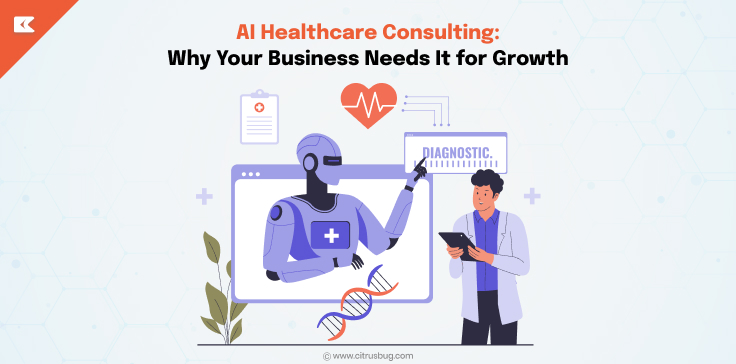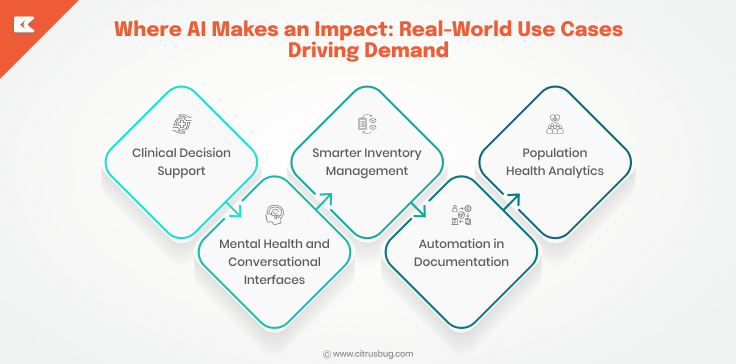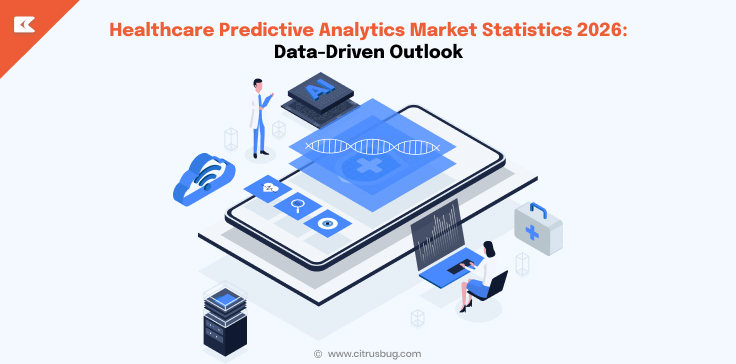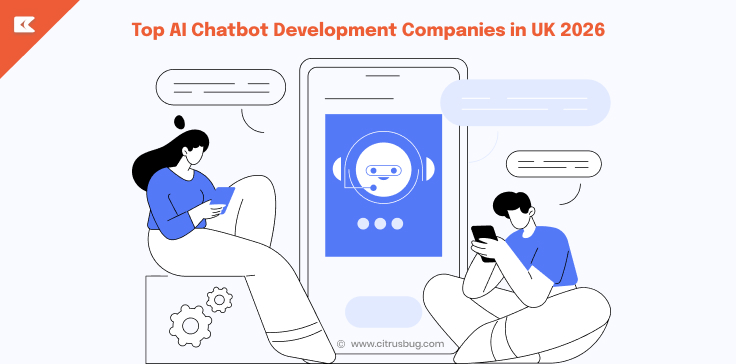Why Your Business Needs Healthcare AI Consulting – Benefits & Use Cases
- July 23, 2025
-
1964 Views
- by Ishan Vyas
Table of Contents
- What Is Healthcare AI Consulting?
- What’s Driving the Demand for Healthcare AI Consulting Today?
- Key Reasons Why Healthcare AI Consulting Is Needed Now:
- Where AI Makes an Impact: Real-World Use Cases Driving Demand
- Why Work with a Healthcare AI Consultant?
- Getting Started with AI in Healthcare: Practical Steps
- Why Healthcare AI Consulting Matters: Key Benefits
- Choosing the Right AI Partner for Healthcare Projects
- Key Use Cases Where AI in Healthcare Demands Strategic Oversight
- Benefits of Hiring Healthcare AI Consultants Over Going In-House
- Wrapping Up: Why Healthcare AI Consulting Deserves a Closer Look

AI is quietly becoming the backbone of modern healthcare transformation. From reducing diagnostic errors to enhancing administrative workflows, its impact can be seen across the entire care continuum. Yet, successful implementation goes beyond installing algorithms; it requires aligning technology with clinical workflows, ensuring data readiness, and adapting to evolving compliance norms.
This is where healthcare AI consulting comes into play.
These consulting services guide organizations through the complexity of AI adoption by helping them identify relevant use cases, ensure data security, and adapt solutions to the needs of patients, providers, and administrators alike.
As the landscape continues to evolve with developments like personalized treatment pathways, medical content generation, and AI-assisted decision-making, there’s a growing emphasis on responsible and domain-specific deployment. Several industry discussions now highlight how technologies like generative AI are being tailored to healthcare-specific challenges, especially in areas like medical documentation and patient engagement. Similarly, broader AI adoption patterns across hospitals, diagnostics, and pharma are shaping how care is delivered and consumed.
What Is Healthcare AI Consulting?
Healthcare AI consulting is a specialized service that helps healthcare organizations plan, design, and implement artificial intelligence solutions tailored to clinical and operational use cases. It bridges the gap between medical workflows and intelligent systems by offering expert guidance across data management, compliance, integration, and AI model selection.
Consultants typically assess the organisation’s existing infrastructure, identify high-impact AI opportunities (such as diagnostics support, clinical documentation automation, or operational forecasting), and provide a roadmap for secure, scalable implementation.
This type of consulting often includes:
- Use Case Discovery: Identifying where AI can add measurable value in clinical decision support, patient triage, resource allocation, etc.
- Data & Infrastructure Readiness: Reviewing EHR systems, interoperability gaps, and available datasets for model training and deployment.
- Technology & Model Strategy: Recommending the right ML or NLP models based on data availability, task complexity, and risk tolerance.
- Regulatory & Compliance Guidance: Ensuring that AI systems align with HIPAA, GDPR, and other healthcare-specific compliance standards.
- Integration & Training: Embedding AI solutions into existing workflows and training stakeholders to interpret and use AI-generated outputs effectively.
In short, healthcare AI consulting provides the strategic and technical expertise required to move AI projects from exploration to execution, while ensuring they align with clinical standards, ethical considerations, and data governance policies.
What’s Driving the Demand for Healthcare AI Consulting Today?
As healthcare systems generate vast volumes of data every second from patient histories and diagnostic scans to billing records and supply chain logistics managing this information efficiently has become a critical challenge.
AI can streamline this complexity. But deploying it successfully in healthcare settings requires more than just technical knowledge. That’s where AI consulting plays a pivotal role: it bridges the gap between clinical needs and intelligent digital solutions.
Key Reasons Why Healthcare AI Consulting Is Needed Now:
Rising Operational Burden
Hospitals are struggling to balance patient care with administrative demands. AI consultants can help automate routine tasks like appointment scheduling or billing, reducing manual overhead and improving patient experience.
Data Without Direction
Healthcare providers may have access to years of EHR data, but lack the expertise to turn it into actionable insights. AI experts bring in the frameworks to analyze, predict, and optimize care pathways.
Changing Patient Expectations
With the rise of telemedicine and on-demand services, patients now expect more responsive, personalized care. AI-driven systems like virtual assistants and diagnostic tools are becoming indispensable.
Regulatory Pressures
Compliance with HIPAA, HL7, and FDA guidelines is increasingly complex. Specialized consulting ensures your AI systems are designed with regulatory alignment from the ground up.
As consulting helps demystify AI’s role across departments, its benefits extend beyond diagnosis and treatment. From intelligent inventory systems that reduce medicine waste to NLP models that enhance clinical documentation, the ripple effect of effective AI implementation is wide-reaching.
Where AI Makes an Impact: Real-World Use Cases Driving Demand
AI in healthcare is not just theoretical anymore it’s being applied meaningfully across diverse use cases. From clinical decision-making to back-end operations, AI consultants help organizations identify the most valuable areas to deploy intelligent systems.
Here’s a closer look at high-impact scenarios:
Clinical Decision Support
AI models are now being used to support diagnostic accuracy and treatment planning. By processing large sets of medical data like patient histories, lab results, and imaging AI helps clinicians make more informed decisions.
Some organizations exploring this space have already implemented decision-support tools as part of broader AI healthcare software solutions.
Mental Health and Conversational Interfaces
AI chatbots are increasingly used to manage initial patient interactions, schedule appointments, and even offer basic mental health support. These systems don’t replace professionals but they help reduce wait times and improve accessibility.
Smarter Inventory Management
Hospitals often struggle with stockouts or overstocking. AI-based inventory systems bring real-time visibility to what’s on hand and what’s needed, helping reduce both waste and critical supply delays.
Automation in Documentation
Physicians spend hours each week on administrative documentation. Generative AI is now helping reduce that burden by auto-summarizing consultations and generating structured medical records.
More customized approaches are emerging too, including generative AI models tailored for healthcare use.
Population Health Analytics
By analyzing patterns in patient data, AI can flag potential risks before they escalate whether it’s predicting readmissions, identifying vulnerable populations, or forecasting seasonal disease spikes.
Why Work with a Healthcare AI Consultant?
AI in healthcare isn’t just about choosing the right model or algorithm. It’s about aligning solutions with regulatory frameworks, clinical workflows, and real-world constraints. This is where a specialized AI healthcare consultant can offer unmatched value.
What an AI Consultant Brings to the Table:
- Problem-solution alignment: Instead of jumping to a tool, consultants assess whether the problem actually needs AI or a simpler digital fix.
- Domain-specific architecture: From clinical NLP to radiology-focused image recognition, a good consultant helps choose or build models that are fit for healthcare, not just general AI.
- Interoperability support: Consultants ensure that AI tools can integrate with your EHR systems and comply with HL7, FHIR, or other relevant protocols. This is often part of broader healthcare IT consulting services.
- Responsible data use: Patient data is sensitive. Consultants design systems that align with HIPAA or GDPR rules and help teams navigate ethical concerns. In many cases, organizations benefit from a dual approach pairing consulting with hands-on AI healthcare software development to build scalable, compliant tools from the ground up.
Getting Started with AI in Healthcare: Practical Steps
You don’t need to overhaul your entire tech infrastructure to leverage AI. In fact, some of the most impactful healthcare AI projects start small, targeting a single use case, improving one process, or automating one manual task.
Let’s break down the practical steps involved in getting started:
Step 1: Identify Pain Points Worth Solving
Use AI only where it truly creates value. Examples include:
- Reducing patient no-shows
- Forecasting medication demand
- Triage automation using symptom checkers
AI consulting helps validate whether these are best addressed using traditional software, machine learning, or generative AI.
Step 2: Assess Data Readiness
Ask:
- Is your data structured?
- Is it anonymized or de-identified?
- Are you following regional regulations like HIPAA or GDPR?
If not, an AI initiative may first require foundational work through healthcare software development services that prioritize data integrity.
Step 3: Choose a Use Case with Real ROI
Healthcare AI consulting teams often recommend:
| Use Case | AI Approach | Outcome |
|---|---|---|
| Patient engagement | NLP & chatbots | 24/7 support, better follow-ups |
| Diagnosis assistance | Computer vision | Faster image-based detection |
| Documentation | Generative AI | Reduced admin burden for clinicians |
Step 4: Build or Integrate
This is where consulting transitions into execution. You can:
- Build custom AI models tailored to your workflow
- Integrate third-party AI APIs into your current EHRs
- Develop proof-of-concept apps to test before scaling
Why Healthcare AI Consulting Matters: Key Benefits
AI is not a plug-and-play solution, especially in a domain as sensitive as healthcare. The right consulting partner helps you navigate complexity, unlock efficiency, and avoid costly missteps. Here’s how:
Expertise That Translates to Action
AI consultants bring both healthcare context and tech expertise. They help:
- Align AI strategies with clinical goals
- Select the right models machine learning, NLP, or custom generative AI
- Ensure ethical data use and compliance
Rather than chasing trends, you’ll invest in tech that fits your use case.
Early Validation Through Prototyping
Consulting teams often build quick prototypes or proof-of-concept tools to test real-world value before scaling. For example:
- Automating appointment reminders → 18% drop in no-shows
- Flagging radiology scans for review → faster diagnosis cycle
Many of these early wins align with evolving AI trends in healthcare, like predictive modelling and image analysis.
Tailored Implementation
Rather than one-size-fits-all software, AI consultants create solutions tailored to your data environment, workflows, and integration needs. This might involve:
- Developing modules that plug into existing EMRs
- Creating lightweight tools for specific departments
- Ensuring user training and adoption strategies are in place
When needed, AI healthcare software development services come into play to support full-cycle implementation.
Choosing the Right AI Partner for Healthcare Projects
Picking the right AI consultant isn’t just about technical know-how; it’s about finding someone who understands the intricacies of healthcare, from patient privacy laws to operational bottlenecks. Here’s what to look for:
Checklist: What to Look For in a Healthcare AI Consultant
| Criteria | What It Means | Why It Matters |
|---|---|---|
| Healthcare domain experience | Familiarity with clinical, admin, and regulatory workflows | Minimizes the risk of mismatched solutions |
| Custom AI capabilities | Proficiency in building tailored models, not just off-the-shelf tools | Enables solutions that adapt to your system, not the other way around |
| Security & compliance readiness | Knowledge of HIPAA, HL7, GDPR | Protects patient data and builds trust |
| Integration approach | Experience integrating with EHRs, hospital CRMs, or billing tools | Ensures AI fits your ecosystem seamlessly |
Realistic Roadmaps Over Hype
A reliable AI partner won’t promise overnight transformation. Instead, they’ll offer:
- Transparent timelines and ROI expectations
- Modular rollout plans starting small, iterating fast
- Metrics that focus on impact, not just performance
If your goal is to develop future-ready, secure, and scalable systems, working with a specialized healthcare software development company makes all the difference.
Key Use Cases Where AI in Healthcare Demands Strategic Oversight
While AI has countless applications in healthcare, certain use cases call for more than just technology; they require thoughtful planning, customization, and domain expertise.
1. Clinical Decision Support
What it does:
Analyzes patient history, lab results, and symptoms to assist doctors in making more accurate diagnoses and treatment decisions.
Why expert guidance matters:
Models must be aligned with local medical practices and datasets. A consultant helps ensure the system integrates seamlessly into the existing clinical workflow without disrupting the physician’s process.
2. Diagnostic Imaging
AI tools can review X-rays, MRIs, and other scans with high accuracy, spotting patterns and anomalies faster than human review alone.
3. Patient Engagement Assistants
Conversational AI, such as chatbots and voice-based tools, are improving the way patients book appointments, get follow-up care instructions, or receive medication reminders.
What consulting adds:
Customization is key. An advisor helps tailor interactions to patient needs, improve accessibility, and maintain HIPAA compliance, so the tool supports care without overwhelming patients or staff.
4. Supply Chain & Inventory Planning
AI can forecast medication usage, manage medical supplies, and reduce waste in hospitals or clinics.
But it must be trained on your environment.
Healthcare consultants help build predictive systems around your facility’s procurement cycles, patient load, and vendor behaviour.
5. Document & Workflow Automation (Generative AI)
Generative AI can auto-generate discharge summaries, patient education content, and even assist with documentation.
But applying this in healthcare comes with risks. It’s crucial to define safety checks and content boundaries.
Benefits of Hiring Healthcare AI Consultants Over Going In-House
Building AI capabilities internally can seem like the more flexible route, but in healthcare, that approach often comes with hidden costs, both financial and operational. Working with an experienced AI consultant offers several distinct advantages.
1. Faster, More Focused Execution
In-house teams may need time to upskill, understand regulatory nuances, and explore use case feasibility. A consultant brings immediate clarity, reducing trial-and-error cycles and helping you move from idea to implementation with fewer delays.
2. Cross-Disciplinary Expertise
Consultants combine healthcare domain knowledge with technical depth across AI, data engineering, compliance, and product strategy. This allows you to make informed decisions without building five different teams.
For example, deploying AI responsibly in clinical documentation often involves a mix of natural language processing, generative models, and HIPAA-conscious design.
3. Reduced Risk of Failure
Many internal teams underestimate the effort involved in aligning AI solutions with clinical workflows or data readiness. Consultants help mitigate those risks early by flagging integration bottlenecks, compliance gaps, or unsuitable models.
4. Cost Efficiency Without Long-Term Overhead
Hiring full-time data scientists, healthcare domain experts, ML engineers, and compliance officers isn’t always feasible, especially for mid-sized providers or startups. Consulting provides access to that expertise without permanent costs.
5. Strategic Planning for Long-Term Scale
Consultants don’t just solve today’s problems, they help design for what’s next. That includes choosing scalable architectures, building feedback loops for AI accuracy, and aligning with broader digital transformation goals.
In many cases, this strategy becomes the foundation for long-term healthcare product innovation, supported by custom software development teams when needed.
Wrapping Up: Why Healthcare AI Consulting Deserves a Closer Look
Healthcare providers are navigating a complex digital environment where innovation must go hand-in-hand with responsibility. AI offers unprecedented possibilities, but implementing it effectively requires much more than just the right algorithm.
Whether it’s automating diagnostic support, streamlining patient interactions, or improving data-driven decision-making, a focused consulting partnership can help translate abstract AI ambitions into tangible outcomes.
If you’re exploring where AI could create real impact in your systems, it may help to examine how others are using it. For example, these real-world AI use cases in healthcare shed light on what works and why. Similarly, keeping track of emerging AI trends in healthcare can offer a fresh perspective on what’s gaining traction across the industry.
From custom generative models for medical documentation to chatbot integrations that reduce front-desk burden, AI is gradually reshaping core functions. But every healthcare setting is different, and thoughtful consulting can bridge that gap between generic technology and purpose-built value.





 SaaS Development
SaaS Development Web Application Development
Web Application Development Mobile Application Development
Mobile Application Development Custom Software Development
Custom Software Development Cloud Development
Cloud Development DevOps Development
DevOps Development MVP Development
MVP Development Digital Product Development
Digital Product Development Hire Chatbot Developers
Hire Chatbot Developers Hire Python Developers
Hire Python Developers Hire Django Developers
Hire Django Developers Hire ReactJS Developers
Hire ReactJS Developers Hire AngularJS Developers
Hire AngularJS Developers Hire VueJS Developers
Hire VueJS Developers Hire Full Stack Developers
Hire Full Stack Developers Hire Back End Developers
Hire Back End Developers Hire Front End Developers
Hire Front End Developers AI Healthcare Software Development & Consulting
AI Healthcare Software Development & Consulting Healthcare App Development
Healthcare App Development EHR Software Development
EHR Software Development Healthcare AI Chatbot Development
Healthcare AI Chatbot Development Telemedicine App Development Company
Telemedicine App Development Company Medical Billing Software Development
Medical Billing Software Development Fitness App Development
Fitness App Development RPM Software Development
RPM Software Development Medicine Delivery App Development
Medicine Delivery App Development Medical Device Software Development
Medical Device Software Development Patient Engagement Software Solutions
Patient Engagement Software Solutions Mental Health App Development
Mental Health App Development Healthcare IT Consulting
Healthcare IT Consulting Healthcare CRM Software Development
Healthcare CRM Software Development Healthcare IT Managed Services
Healthcare IT Managed Services Healthcare Software Testing services
Healthcare Software Testing services Medical Practice Management Software
Medical Practice Management Software Outsourcing Healthcare IT Services
Outsourcing Healthcare IT Services IoT Solutions for Healthcare
IoT Solutions for Healthcare Medical Image Analysis Software Development Services
Medical Image Analysis Software Development Services Lending Software Development Services
Lending Software Development Services Payment Gateway Software Development
Payment Gateway Software Development Accounting Software Development
Accounting Software Development AI-Driven Banking App Development
AI-Driven Banking App Development Insurance Software Development
Insurance Software Development Finance Software Development
Finance Software Development Loan Management Software Development
Loan Management Software Development Decentralized Finance Development Services
Decentralized Finance Development Services eWallet App Development
eWallet App Development Payment App Development
Payment App Development Money Transfer App Development
Money Transfer App Development Mortgage Software Development
Mortgage Software Development Insurance Fraud Detection Software Development
Insurance Fraud Detection Software Development Wealth Management Software Development
Wealth Management Software Development Cryptocurrency Exchange Platform Development
Cryptocurrency Exchange Platform Development Neobank App Development
Neobank App Development Stock Trading App Development
Stock Trading App Development AML software Development
AML software Development Web3 Wallet Development
Web3 Wallet Development Robo-Advisor App Development
Robo-Advisor App Development Supply Chain Management Software Development
Supply Chain Management Software Development Fleet Management Software Development
Fleet Management Software Development Warehouse Management Software Development
Warehouse Management Software Development LMS Development
LMS Development Education App Development
Education App Development Inventory Management Software Development
Inventory Management Software Development Property Management Software Development
Property Management Software Development Real Estate CRM Software Development
Real Estate CRM Software Development Real Estate Document Management Software
Real Estate Document Management Software Construction App Development
Construction App Development Construction ERP Software Development
Construction ERP Software Development







